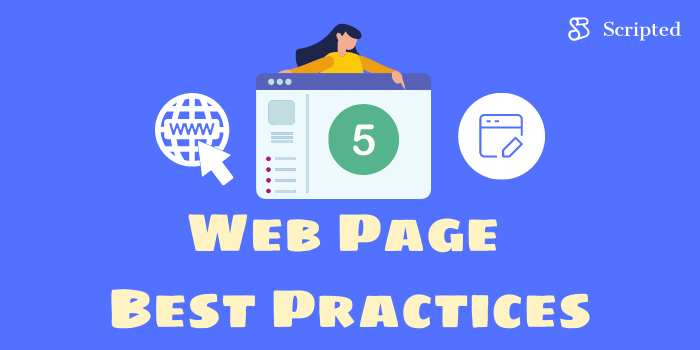5 Web Page Best Practices

You may have excellent landing pages to draw in your audience and provide a great first impression, but does the rest of your website offer the same level of quality? From your homepage to service pages, refresh your online presence and reduce bounce rates with these five web page best practices.
Web Page Content Writing
Before you dive into tips for writing content for your website, it’s important to review the benefits of working with professional content writers. These web page best practices can help you improve your ROI and deliver quality content to your customers, but web pages still take a considerable amount of time to write effectively.
Save time and access the latest content writing strategies by hiring a writer to help you build your online presence. Connecting with a web page writer helps you find quality web page content that offers these benefits:
- Guaranteed quality
- Search engine optimized keywords and headers
- Tone and voice to match your brand
- Clear, easy-to-read design
How Are Web Pages Formatted?
Your web pages should capture the readers’ interest and invite them to connect with your brand. The specific format you choose depends on your branding and your goals with your website.
Some pages are all about informing your audience. Others are focused more on displaying your contact information or products. Web page best practices include using the right format to make them easy to read, easy to scan, and easy to connect.
What Are the Current Trends in Web Page Writing?
Some of the latest trends in web page writing support quality content. AI-powered tools, video marketing, and other trends are shaping the way your audience experiences web pages. They aren’t, however, replacing quality content. Use these tips for writing content for your website to create web pages, video transcripts, and other features to make your website stand out.
Golden Rules of Writing Content for Your Website
The golden rules of writing content for your website aren’t guaranteed to deliver search results. Be wary of a content writer or digital marketing strategist who claims they can make your website rank #1 in a Google search, as they are likely using short-term strategies that don’t promote overall growth.
Instead, use these web page best practices to organically grow your audience and web page visibility.
1. Know Your Audience and Your Voice
The first rule of web page best practices may be the most obvious, but it’s still one that’s all-too-often ignored by business owners and content writers. Be sure you’re working with an experienced writer who puts in the research necessary to understand your audience and your voice.
Your audience research should be detailed. Identify both a primary and secondary audience. Spend some time considering the goals you want for your audience and what your brand can offer them. They’ve likely found your website through a number of channels, so consider the best way to make content accessible for all users.
Your voice shapes the relationship between you and your audience. Are you going for an informal, playful tone or a professional one? Work with a talented content writing team to be sure all your content uses the same voice.
2. Write in an Active, Jargon-Free Style
Active voice projects confidence and clarity. Instead of passively mentioning products that are available or services that can be provided, your website should be more direct. Inform your audience that products and services are available for a more action-directed voice.
Another common mistake is filing your website with jargon. You may sell engineering products and services, but you may also be selling them to an acquisition manager who doesn’t understand all the insider language. Use clear, easily digestible language as you explain the benefits of your company offerings.
3. Create Scannable Content
Other tips for writing content for your website focus exclusively on the content itself, but this web page best practices recommendation is about both content and design. Create scannable content by incorporating these features:
- Plenty of white space
- Bulleted lists
- Descriptive headers
- Multimedia format
4. Use Short Sentences
Run-on sentences may be popular in classic literature, but they aren’t likely to give you great conversion rates on your website. Use clear, concise sentences as you write your content to follow web page best practices.
Short paragraphs also help with readability. Remember that more than 55% of total web traffic is from mobile devices, according to Statista. Keep your content easy to read on a variety of screen sizes.
5. Don’t Forget Your Call-to-Action
One of the most important tips for writing content for your website is to end with a call-to-action, or CTA. Don’t make this too promotional, but give your audience one or more actionable recommendations. Whether it’s to buy a product, contact a sales team, or share a blog post on social media, these easy-to-perform actions help your audience interact with your brand.
Find a Scripted Web Page Writer
Following the golden rules of content writing for your website can seem like a daunting task. Ease your web page writing workload with an expert content writing team from Scripted. Check out web page writers who have the experience you need to write quality content that follows these web page best practices.



